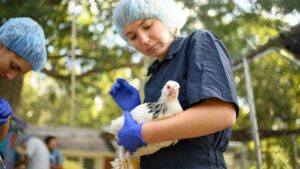August 2020 Research Roundup

A look at some of the latest published research from the NC State College of Veterinary Medicine.
Advancing Comparative Cancer Genomics
A newly developed microarray platform allowing for rapid detection of DNA aberrations in feline tumors shows potential to reliably incorporate domestic cat cancers into comparative and translational oncology research.
Researchers used the platform during genomic profiling of a feline injection-site sarcoma case. Several key cancer-associated genes were revealed during the procedure.
The domestic cat lags behind the domestic dog in terms of integration into translational molecular medicine. The new platform could lead to the further evolution of the comparative cancer genomics field.
The research, published in Veterinary Sciences, is co-authored by Matthew Breen, Luke Borst and Rachael Thomas.
Read the study here.
New Infectious Species Impacting Dogs
A study co-authored by Adam Birkenheuer and Megan Schreeg details the characteristics of Babesia negevi n. sp., a new piroplasmid species infecting dogs.
The new species is part of the western Babesia species group and is associated with severe clinical disease. The new species is infecting dogs in the Middle East, and more research is warranted to reveal the vectors of B. negevi and pinpoint the most effective treatment.
Babesiosis is a tick-borne infection associated with anemia that is life-threatening to humans, as well as domestic and wildlife animals. Dogs are infected by a least six well-characterized Babesia species that cause clinical disease. The new species is named after the Negev, a desert region in southern Israel where the first infected dog originated from. Parasites & Vectors published the research.
Read the study here.
Targeting Vaccines for Bacterial STIs
Chlamydia suis (Cs) vaccination of pre-exposed pigs boosts a non-protective immune response induced by natural infection, according to research led by Tobias Kaeser. The findings suggest that a similar approach could be applied to human vaccine trials.
Pigs are the natural host of Cs, a chlamydia species closely related to Chlamydia trachomatis (Ct). Ct is the most frequent bacterial sexually transmitted infection and can lead to ectopic pregnancy, infertility and blindness in humans. A vaccine is not yet available.
Pigs are susceptible to Ct, making them a valuable animal model for Ct vaccine development for humans.
Co-authors of the research, published in Vaccines, include James Robertson, Lizette Cortes, Andrew Kick and Amanda Amaral.
Read the study here.
A New Case of Polyautoimmunity
A new study outlines the concurrent expression of two or more distinct autoimmune diseases in a dog. Such an expression, called polyautoimmunity, has been observed in humans but rarely reported in dogs.
The research, published in Veterinary Dermatology, outlines lesions seen in an unrelated German shepherd and American Staffordshire that are clinically compatible with pemphigus foliaceus (PF) and generalized discoid lupus erythematosus (GDLE). It is believed to be the first report of PF and GDLE in dogs at the same time.
Co-authors of the research include Petra Bizikova, Ina Herrmann, Lisa Mamo, Keith Linder and Britt Levy.
Read the study here.
Cognitive Development in Assistance Dogs
Research co-authored by Margaret Gruen reviews the cognitive and temperament traits of 8- to 10-week-old dog puppies trained to assist people with disabilities.
The dogs reliably used a variety of cooperative-communicative gestures from humans, remembered the location of hidden food and succeeded in variety of visual, olfactory and auditory discrimination tests. The puppies also showed some skill at tasks requiring inhibitory control and reverse learning.
The findings, published in Animal Behaviour, confirm the early emergence of sensitivity to human communication in dogs.
Read the study here.
Impact of Climate Change on Turtles
Shifting activity patterns of box turtles are potentially related to changes in climate, according to new research led by Greg Lewbart.
The study analyzed medical records of 2,356 wild eastern box turtles admitted to the Turtle Rescue Team at the CVM between 1996 and 2017, looking at temporal shifts in turtle admissions and associations with changes in environmental temperature over the 22 years.
Researchers found that both the annual peak temperature and the annual timing of admission to the Turtle Rescue Team have shifted significantly. Annual peak temperature has increased by 1.3 degrees Celsius, while timing of admission has shifted 17 days earlier between pre- and post-2006 years.
Like other wildlife, reptiles have been suggested as being especially susceptible to the effects of global climate change on the environment. Emile Chen and Zachary Ready co-authored the study, published in the Journal of Zoo and Wildlife Medicine.
Read the study here.
Immune Responses of Chickens

Vaccination in an egg with herpesvirus of turkey (HVT) in meat-type chickens can accelerate innate and adaptive immunity, according to new research.
Previous studies have shown that in ovo vaccination with HVT enhances immune responses in egg-type chicken embryos. The new study evaluated whether such vaccination hastens immunocompetence of commercial chickens. The researchers also note the potential to optimize the immunity effects by modifying the vaccine dose.
Vaccine published the study with authors including Isabel Gimeno, Blanca A. López de Juan Abad, Raveendra Kulkarni, Aneg Cortes, Tobias Kaeser and Allison Boone.
Read the study here.
~Jordan Bartel/NC State Veterinary Medicine


